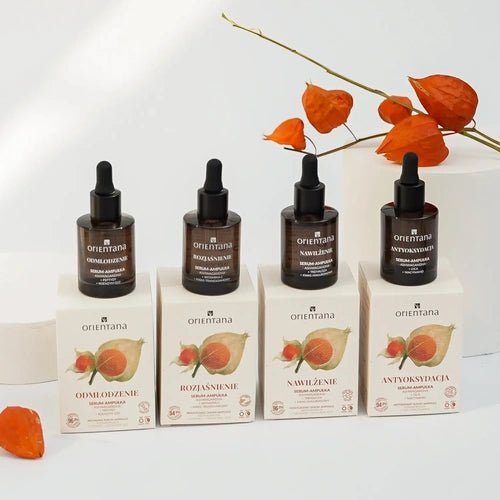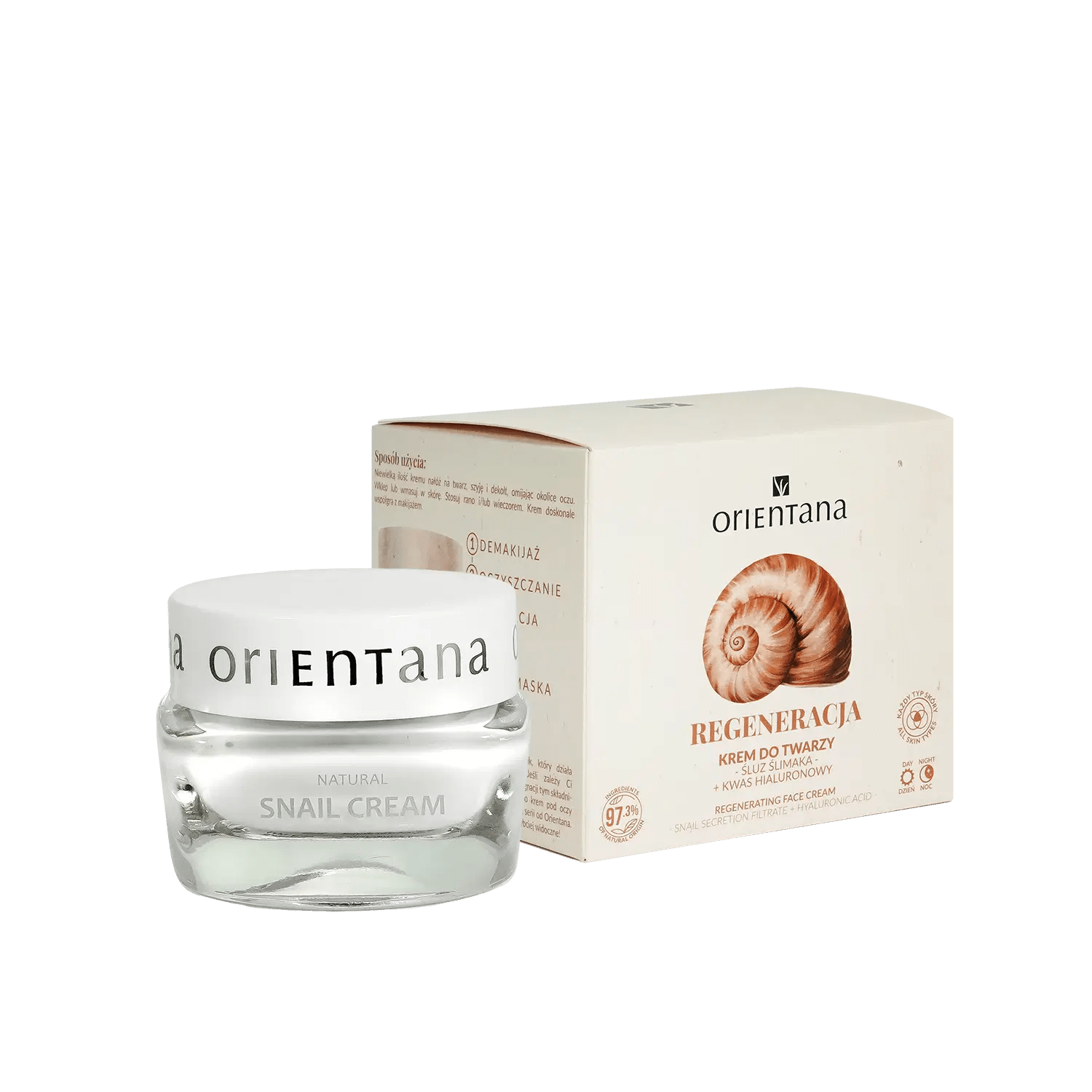In the world of cosmetology, we are increasingly turning to adaptogenic plants – those that support the body (and skin) in the fight against stress. One of them is ashwagandha (Withania somnifera), also known as withania somnifera or Indian ginseng. This is an ingredient used for thousands of years in Ayurveda, which is now coming back into favor in the formulas of modern natural cosmetics. But what is ashwagandha and why is it worth paying attention to its effects?
Let's ask a botanist what Ashwagandha is
Ashwagandha (Withania somnifera) is a plant of exceptional importance in Ayurvedic medicine, also known as withania somnifera, Indian ginseng or winter cherry. It belongs to the nightshade family (Solanaceae) – the same family that includes tomatoes and eggplants. It grows mainly in the arid regions of India, Nepal and Sri Lanka, but is also cultivated in other parts of Asia and Africa. The most valued part of the plant is its root – it is there that the highest concentration of active substances is found.
From a phytochemical perspective, ashwagandha is rich in withanolides , alkaloids , flavonoids and saponins – compounds with strong antioxidant, immunomodulatory and anti-inflammatory effects. Thanks to them, this plant is considered one of the most effective adaptogens – substances that support the body (and skin) in adapting to physical, chemical and emotional stress.
In Ayurveda, ashwagandha has been used for centuries to treat insomnia, anxiety, fatigue and low immunity. Its effects have been confirmed today by numerous scientific studies - both at the level of the entire organism and locally, in the skin. In cosmetology, ashwagandha root extract has been used primarily in soothing, antioxidant and anti-aging products - especially those dedicated to stressed, sensitive skin and with signs of premature aging.
Therefore, if you are wondering what ashwagandha is – it is worth knowing that it is not only a medicinal herb, but also a powerful skin care ingredient that brings visible effects in improving the condition of the skin. Regardless of whether you choose the form of a supplement, serum, ampoule or cream – regular use of ashwagandha can significantly improve the appearance and health of your skin.
Ashwagandha – an adaptogen for stressed skin
Ashwagandha is an adaptogenic plant with strong antioxidant and soothing effects. This means that it helps the skin cope with the negative effects of environmental stress - such as smog, UV radiation, or pollution. Studies show that ashwagandha root extract can reduce cortisol levels in the skin , improve its elasticity and support the natural defense mechanisms of the epidermis.
From a beautician’s perspective, this is an extremely valuable ingredient – especially for people with sensitive, dry, reactive or excessively exposed skin. Ashwagandha has a soothing effect, but at the same time it strengthens the skin, improves its firmness and delays the signs of aging.
Serum-ampoules with ashwagandha – intensive action

Orientana has introduced modern ashwagandha serum-ampoules to its offer, which combine its adaptogenic properties with the action of strong active ingredients such as vitamin C, tranexamic acid , peptides and coenzyme Q10 . This combination is an excellent choice for skin with discoloration, loss of radiance, dryness, lack of firmness and signs of fatigue.
Serum-Ampoule Ashwagandha + Vitamin C + Tranexamic Acid
Brightening and reducing discoloration
The advanced serum combines the adaptogenic properties of ashwagandha with the brightening effects of vitamin C and tranexamic acid, which effectively reduces discoloration. This formula supports the fight against oxidative stress, evens out skin tone and restores its natural glow.
Effect : radiant, even complexion with visibly reduced discolorations.
Serum-Ampoule Ashwagandha + Niacinamide + CICA
Antioxidation and regeneration
A serum with a strong antioxidant effect that combines the adaptogenic properties of ashwagandha with niacinamide and centella asiatica extract (CICA). This formula neutralizes free radicals, supports skin regeneration and strengthens its protective barrier.
Effect : refreshed, regenerated skin with increased resistance to external factors.
Serum-Ampoule Ashwagandha + Trehalose + Hyaluronic Acid
Intensive hydration and soothing
The serum formula provides deep hydration thanks to the synergy of ashwagandha, trehalose and hyaluronic acid. Trehalose protects cells from dehydration, and hyaluronic acid binds water in the epidermis, providing the skin with elasticity and firmness.
Effect : smooth, moisturized skin with a healthy appearance.
Serum-Ampoule Ashwagandha + Peptides + Coenzyme Q10
Rejuvenation and firming
The serum combines the adaptogenic properties of ashwagandha with peptides that stimulate collagen production and coenzyme Q10, which has an antioxidant effect. This formula supports skin regeneration, improves its elasticity and reduces signs of aging.
Effect : firm, elastic skin with visibly reduced wrinkles.
Each of these Orientana serum-ampoules has been developed with different skin needs in mind, combining natural ingredients with modern technologies to provide comprehensive care.
As a beautician, I can confidently recommend this type of product for daily care – especially in the morning, under cream and SPF, as an active booster for the skin.
Ayurvedic face cream with ashwagandha - daily protection and relief

If your skin requires not only intensive action, but also regeneration on a daily basis, it is worth reaching for an Ayurvedic cream with ashwagandha . Such a cream acts as a natural protective barrier - it soothes, nourishes and protects against the effects of environmental stressors. In addition to ashwagandha, its composition often includes shea butter, natural oils and plant extracts with an effect supporting the skin microbiome.
Used regularly, this cream can significantly improve the condition of the skin – smooth it, reduce irritation and give it a healthy, rested appearance.
Ashwagandha and Ayurveda – Spiritual and Physical Balance
If you’re wondering what ashwagandha is , it’s worth starting with its roots – literally and figuratively. For thousands of years, ashwagandha has held an important place in Ayurveda, an Indian system of natural medicine that treats human health holistically. In Ayurveda, ashwagandha is classified as a Rasayana – a group of rejuvenating herbs that are said to restore vitality, support longevity and balance life energy.
Traditionally, ashwagandha has been used to calm the nervous system , improve sleep quality and strengthen immunity . It was especially recommended for people with a disturbed Vata dosha, i.e. those who experience anxiety, fatigue, tension and dryness - also in the skin. In Ayurvedic care formulas, such as creams or massage oils, ashwagandha acts as a protective and regenerating herb , which is not only to take care of the body, but also to support peace of mind.
From the point of view of modern cosmetology, the Ayurvedic approach to ashwagandha gains a new justification: this plant affects not only the skin, but also its neurobiological background – that is, the level of stress and tension that can be seen on the face in the form of redness, dryness or facial wrinkles.
Ashwagandha as a supplement – what does it help with?
Although this is not my area of expertise, it is worth mentioning that modern science confirms what Ayurveda has known for centuries – ashwagandha is a powerful adaptogen that supports not only the skin, but the entire body. As a dietary supplement, ashwagandha is available in capsules, extracts or powder form and enjoys great interest among people living with chronic stress.
What does ashwagandha supplementation help with?
- Reduction of cortisol levels (stress hormone) – studies have shown that regular intake of ashwagandha extract can reduce cortisol levels by up to 27%, which translates into better well-being and reduced muscle tension.
- Improving sleep quality and reducing symptoms of insomnia – thanks to its calming effect, ashwagandha helps to calm the body, which is important not only for mental regeneration, but also for skin health.
- Support for the immune system – thanks to the presence of withanolides, this plant strengthens the body's natural defense mechanisms.
- Increased energy and physical endurance – Ashwagandha supplements are often used by athletes and active people because they can improve muscle strength and performance.
- Support for hormonal balance , including for menopausal women and people with thyroid disorders (especially hypothyroidism).
Interestingly, the effects of supplementation often translate into the appearance of the skin - less stress means less inflammation, better sleep means faster regeneration of the epidermis, and lower cortisol levels mean fewer problems with hormonal acne or loss of skin elasticity.
What is Ashwagandha? Cosmetician Summary
Ashwagandha is one of the most promising adaptogens used in modern care. Its action is based on reducing oxidative stress, improving skin immunity and supporting regenerative processes. If you are wondering how to introduce it into your daily care - ashwagandha serum-ampoules and Ayurvedic face cream are the perfect start. Thanks to this combination, your skin will regain balance, radiant appearance and resistance to external factors - without burdening and risk of irritation.
Finally, I would like to show you how ashwagandha's popularity is shaping up around the world.
Ashwagandha Consumption Around the World – A Global Health and Beauty Trend
Ashwagandha (Withania somnifera), also known as Indian ginseng, has evolved from a local Ayurvedic herb into one of the most recognizable adaptogens in the world . Its popularity has exploded over the past decade in both the wellness and beauty industries, as reflected in market data, scientific publications, and consumer trends.
Global growth in interest
According to the Grand View Research report (2023), the global adaptogen market has reached a value of over USD 13 billion , and ashwagandha holds a leading place in it , next to reishi, ginseng and rhodiola. Its presence in dietary supplements, functional drinks, superfoods and cosmetics is constantly growing.
- USA : leader in ashwagandha supplement consumption. In 2022, it was among the top ten best-selling botanicals in American pharmacies and health food stores.
- Europe : Particularly popular in Germany, Great Britain, Poland and Scandinavian countries. Used in anti-stress supplements, women's adaptogens and sleep-enhancing products.
- Asia : India remains the largest producer and exporter, where ashwagandha is also a culturally embedded ingredient in Ayurveda. In China and Japan, it finds its way into nutraceuticals and immune-supporting tonics.
- Australia and South America : Growing interest among vegan and mindful consumers as part of slow health.
Main forms of consumption
-
Dietary supplements (capsules, powders, standardized extracts)
– most often chosen to reduce stress, improve sleep, support hormones and immunity. -
Adaptogenic Drinks and Functional Foods
– smoothies, herbal lattes (e.g. “moon milk”), ashwagandha bars. -
Natural cosmetics and dermocosmetics
– creams, serums and tonics using its antioxidant and anti-inflammatory effects, supporting the skin in conditions of environmental stress.
The 21st Century Consumer and Ashwagandha
Today's consumer is looking for ingredients that work holistically - both on the body and mind. Ashwagandha fits this need perfectly:
- reduces stress (acts on cortisol level),
- supports the nervous and hormonal systems,
- has a positive effect on the appearance of skin and hair.
That's why wellness, supplement and cosmetic brands around the world are eager to use this ingredient.






